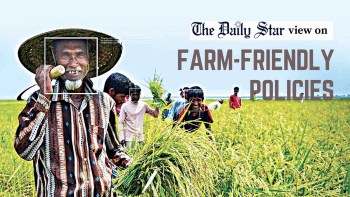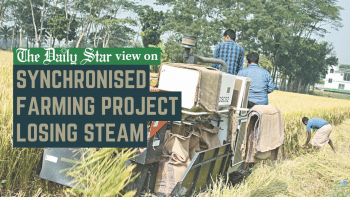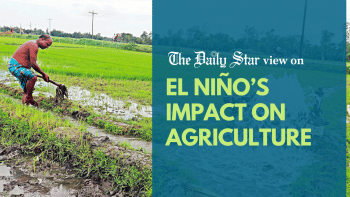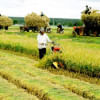Agriculture must adapt to climate change

It is a proven fact that climate change is severely affecting agriculture in Bangladesh. Temperatures are consistently rising along with decreased rainfalls, leading to increased salinity, and thus changing our once-fertile lands into dust bowls or lands with poor yields. Its implications for our food security cannot be more profound. Take rice, our main staple. Varieties that need expensive fertilisers and pesticides have replaced many indigenous, high-yielding varieties of paddy that were nutritious and required no chemicals to grow. While we commend the efforts of the agricultural agencies in developing climate-resilient crops, future efforts must reflect the urgency and innovation necessitated by the intensifying climate change.
A report on Koyra, Khulna tells a positive story about how vast lands left barren by increasing salinity are being turned fertile with farmers planting paddy, vegetables and fruits, while also engaging in fish farming. This has been possible through various government bodies, such as the Department of Agricultural Extension and the Bangladesh Agricultural Research Institute (BARI), which support farmers by providing them with salinity-resistant seeds, advice, training and fertilisers. By adapting to cultivation of salinity-tolerant crops and going into fish farming, these farmers are becoming more solvent and do not have to leave their homes to seek employment elsewhere. Therefore, the community as a whole has benefitted.
The Koyra model must be replicated all over the country, especially in districts like Patuakhali where many farmers have had to abandon their ancestral profession for low-paying jobs in the cities, because the lands they grew crops in have become barren. A report in this paper quotes an official of the Meteorological Department of Patuakhali stating that over the last six years, the average temperature in the district has increased by at least 4.5 degrees Celsius. Rains start much later than before and for shorter periods of time. The high temperatures destroy many of the paddy saplings, and lack of rain leads to low-quality yields, only fit for poultry feed. The number of people engaged in agriculture has thus significantly dropped in the last 10 years.
The government must focus on these districts—once major producers of crops but now left with vast areas of fallow lands. We urge the government to mobilise its relevant agricultural bodies and collaborate with private organisations to invest in research of climate-resilient crops specific to these districts. The government should incentivise farmers to return to their farmlands and grow crops again.


 For all latest news, follow The Daily Star's Google News channel.
For all latest news, follow The Daily Star's Google News channel. 










Comments